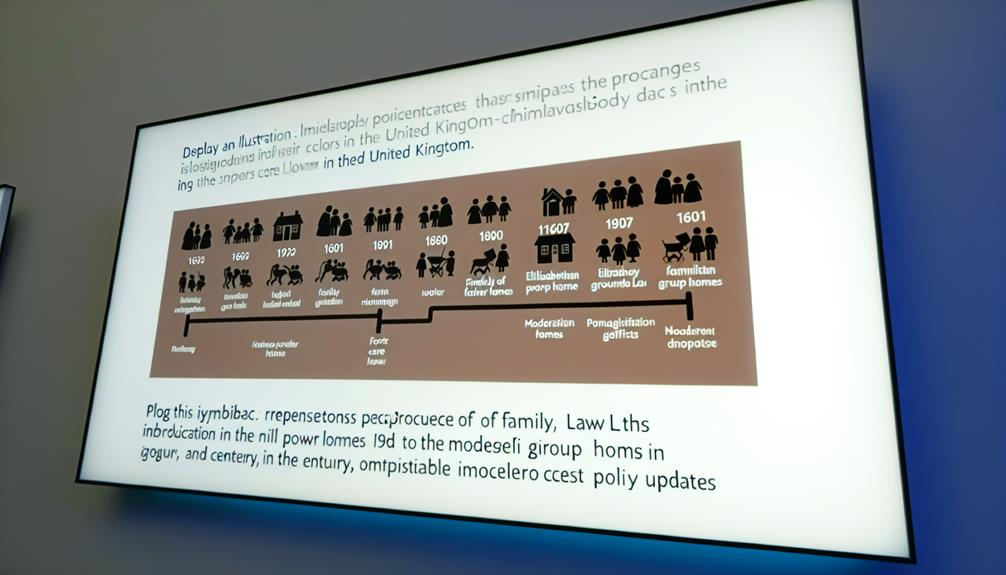UK's foster care policies are evolving, with recent shifts placing child welfare at the forefront. Policies are more child-centered now, emphasizing individual needs and rights. Changes in legislation stress continuous training for foster parents, aimed at delivering the best care possible. Adjustments aren't restricted to care, though – the approval process for foster parents has been revamped, attracting diverse applicants. Financial support has been updated too, considering the specific needs of foster children. It predicts a more efficient, effective foster system. There's a lot you could discover should you choose to journey further into the world of UK foster care policies.
Key Takeaways
- UK's foster care policies have evolved to prioritize a child-centered approach, focusing on the individual needs and rights of the child.
- Updated foster care regulations emphasise training for foster parents, alongside policy awareness, to ensure best care and child welfare.
- New legislation has led to a shift in the foster care landscape, with potential loopholes and unintended consequences on foster parents.
- The approval process for foster carers has been revamped, requiring in-depth evaluation and a focus on essential skills and knowledge.
- Future policies in UK's foster care system are anticipated to eliminate regulation loopholes, introduce stricter protocols, and integrate technology.
Historical Overview of UK Foster Care

To fully understand the current state of the UK's foster care system, you must first explore its rich and complex history. The origins of the UK's foster care can be traced back to the Poor Law of Elizabethan times, where children were taken from impoverished families and placed in apprenticeships. However, it wasn't until the 19th century that the idea of foster care, as it's understood today, began to take shape with the introduction of the 'boarding out' system.
The 'Evolution of Training' for foster parents has greatly changed the course of the system. Initially, there was little to no formal training for foster parents. They were simply good-hearted individuals willing to take in needy children. But as society's understanding of child development and psychology grew, so did the demand for specialised training. By the late 20th century, potential foster parents were required to undertake intensive training covering topics such as trauma, behavioural management and the legal rights of foster children.
At its core, the UK's foster care system is a reflection of society's changing attitudes towards child welfare. Today, it's a system that prioritises the needs of the children, thanks to its rich history and the evolution of training.
Recent Changes in Foster Care Legislation
You've seen the history, now let's turn your attention to the recent changes in UK's foster care legislation. Consider the updated rules and their impact, and don't overlook the challenges that come with implementing new laws.
It's an intricate landscape, but understanding these points will give a holistic view of today's foster care system.
Updated Foster Care Rules
In recent years, numerous adjustments to UK's foster care legislation have substantially reshaped the landscape of child welfare, prompting a pivotal shift in the approach to foster care. These changes have been driven by a heightened emphasis on policy awareness and carer training.
New legislation mandates thorough, ongoing training for foster carers, equipping them with the skills necessary to provide best care. It's also designed to make sure they're fully aware of the rights, responsibilities and resources connected to their role. This shift demonstrates a keen focus on the welfare of the children, underlining the notion that well-informed, well-trained carers are better equipped to support their needs.
These updated rules serve to redefine the foster care system in the UK, reflecting a more holistic, child-centred approach.
Impact of New Legislation
The recent overhaul in foster care legislation has greatly impacted both carers and children, ushering in a new era of child welfare in the UK. The changes, while designed to enhance conditions and outcomes for all stakeholders, have also revealed legislation loopholes and unintended consequences.
Let's contemplate three major impacts:
- Legislation Loopholes: Despite the best intentions, the new rules have uncovered grey areas that can be exploited. For instance, the definition of 'suitable care' leaves room for interpretation, potentially compromising quality of care.
- Unintended Consequences: These changes have inadvertently increased administrative burdens on foster parents, creating a barrier for potential carers.
- Positive Outcomes: Undeniably, there have been improvements. The heightened focus on children's rights and welfare has led to more thorough and child-centred care plans.
You'll need to take into account these shifts as you navigate the updated foster care landscape.
Challenges in Implementation
Often, implementing these new foster care legislations presents a unique set of challenges that you'll need to understand and address. Legislative interpretation may vary, and policy resistance can play a significant role in the successful application of these laws.
Let's break it down:
| Challenge | Impact | Mitigation Strategy |
|---|---|---|
| Legislative Interpretation | Ambiguity in understanding laws | Adequate training and guidance |
| Policy Resistance | Resistance to new policies | Effective communication and stakeholder engagement |
| Resource Allocation | Insufficient funds or manpower | Lobbying for more resources |
| Compliance | Difficulty in adherence | Regular audits and feedback loops |
| Cultural Change | Resistance to new practices | Organisational change management |
Impact of New Policies on Foster Parents
As a foster parent, you'll find these new policies altering the landscape of foster care in the UK, necessitating a shift in your approach and understanding. The emotional impact of these changes can be significant but isn't without positive outcomes.
- Parental Training: The heightened emphasis on training guarantees that you're better equipped to deal with the challenges of fostering. You'll receive detailed guidance on diverse issues, from managing trauma to boosting development, improving your ability to provide a supportive environment.
- Financial Impact: The new policies promise improved financial support, acknowledging the economic realities of foster care. This implies that you'll be less financially strained and better able to meet the child's needs.
- Support Systems: The introduction of structured support systems aims to alleviate the emotional toll of fostering. You'll have access to professional help and peer networks, providing a safety net during tough times.
The overall effect of these new policies is transformative. While they might take some getting used to, they're designed with the best interests of both you and the child in mind. By embracing these changes, you'll be playing a pivotal role in advancing the quality of foster care in the UK.
The Shift Towards Child-Centered Policies

Shifting the spotlight onto child-centered policies, it's clear that the UK's foster care system is now prioritising the individual needs and rights of foster children, ensuring they're not just passive recipients but active participants in their own care. This shift embodies child empowerment, granting foster children a voice in decisions that directly affect their lives and future.
As part of this paradigm shift, trauma informed care has become a cornerstone in the new policy framework. Recognising the adverse experiences that many foster children have endured, it's vital to understand and address their emotional and psychological needs. You'll notice that the new policies aim to create a healing environment, one that acknowledges past traumas and fosters resilience.
Moreover, this child-centered approach isn't limited to reactive measures. It's also about proactive strategies that equip children with life skills, fostering confidence and independence. The increased emphasis on educational and recreational opportunities is proof of this.
Changes in Approval Process for Foster Carers
In the wake of these child-centered reforms, you'll also find significant alterations in the approval process for foster carers. These changes are primarily designed to enhance the quality of care provided to foster children. They focus on areas such as carer training programs and foster care recruitment.
Enhanced Carer Training Programs: The approval process now requires more rigorous training for potential foster carers. You'll notice a shift towards thorough programs aimed at equipping carers with essential skills and knowledge to provide excellent care.
Revamped Foster Care Recruitment: The recruitment process has been restructured to attract a diverse array of potential carers. It's now more inclusive, considering applicants from various backgrounds, thereby increasing the pool of prospective foster carers.
In-depth Evaluation: The assessment of potential carers is now more meticulous. It includes an examination of their ability to meet the specific needs of foster children, their understanding of the role and its challenges, and their commitment to continuous learning and improvement.
These changes are paving the way for a more efficient and effective foster care system. They're creating a more robust, prepared, and diverse pool of foster carers, better equipped to provide exceptional care for foster children.
Updated Financial Support for Foster Families

Amidst these policy shifts, you'll also see a necessary update in financial support for foster families, aimed at adequately compensating carers for the critical role they play. This approach recognizes the often-underestimated commitment and sacrifice these families make.
The updated support includes a thorough financial literacy training program. You'll find this invaluable in managing the increased funds, which are now more than just a subsistence allowance. This training is designed to empower you with knowledge on budgeting, saving, and financial planning, enabling you to provide a stable environment for the foster child.
Simultaneously, the policy also addresses tax implications for foster families. You'll benefit from a clearer, more just tax system designed to reduce your financial burden. The updated policy delineates the foster care allowance as non-taxable, providing you with more disposable income to meet the needs of the child.
In a nutshell, these changes indicate a shift towards a more detailed and fairer financial support system for foster families. In the long run, these updates shouldn't only improve the quality of care but also encourage more prospective carers to contemplate fostering.
Influence of Policy Changes on Foster Children
While these financial adjustments greatly support foster families, it's also important to explore how the policy changes directly impact the foster children themselves. The influence of these shifts can be seen in three major areas:
- Stability: Reduced financial stress for foster families can lead to long-term placement stability for the children. They're less likely to be moved around, which can strengthen their resilience and sense of security.
- Wellbeing: With more resources, foster families can better cater to the physical, emotional, and educational needs of the children, enhancing their overall wellbeing and potential for success.
- Independence: Some policies provide support for young adults who've aged out of the system, assisting them in transitioning into independent living and reducing the risk of homelessness or unemployment.
However, despite these positive impacts, there are still policy shortcomings that need to be addressed. For instance, the system's focus on immediate safety sometimes overlooks the long-term developmental needs of the children. Not all children in the foster care system receive the same level of support due to inconsistencies in policy implementation.
Future Predictions for UKs Foster Care Regulations

Looking ahead, you might wonder what the future holds for UK's foster care regulations, given both the positive impacts and shortcomings of current policies. One probable focus is the elimination of regulation loopholes. These omissions, which have allowed for inconsistencies and potential abuse in the foster care system, are likely to be addressed. You can anticipate stricter protocols and standards to guarantee the welfare of every child in foster care.
Additionally, technology integration is projected to play a more significant role. Advanced tracking systems, virtual training for foster parents, and online platforms for inter-agency coordination could be on the horizon. This integration could streamline processes, promote transparency, and foster collaboration among stakeholders.
However, these predictions are contingent on the government's commitment to prioritising children's welfare and investing in the necessary resources. It's also vital to remember that while technology can enhance efficiency, it's not a panacea. Human judgement and compassion remain paramount.
Frequently Asked Questions
How Do the Uk's Foster Care Policies Compare to Those in Other Countries?
You're evaluating UK's foster care policies, aren't you? Compared to other countries, the policy impact and foster care legislation in the UK show a progressive shift towards child-centered approaches and increased support for foster families.
What Kind of Training Is Provided for New Foster Carers in the Uk?
In the UK, new foster carers undergo rigorous training. It covers topics like child development, managing behavior, and understanding trauma. It's part of the Carer Recruitment process, ensuring Foster Finances are properly allocated.
How Are the Uk's Foster Care Policies Influenced by International Guidelines or Conventions?
Global impact greatly shapes UK's foster care policies. They're evaluated against worldwide standards, ensuring they align with international conventions. You'll find these guidelines influencing policy transformations, aiming for the best possible care standards.
How Do the Policy Changes Affect the Adoption Process in the Uk?
You'll find that adoption criteria revisions have legal implications that alter the adoption landscape in the UK. Such changes could streamline the process, but also create new hurdles for potential adoptive parents.
What Support Systems Exist for Children Transitioning Out of the Foster Care System in the Uk?
You'll find that the UK has robust support systems for kids moving out of foster care. Caregiver support is a cornerstone, helping address movement challenges. They offer services like counselling, education, and housing assistance.
Conclusion
To conclude, it's evident that 'the times they're a-changin' for UK's foster care system. These new policies, leaning towards child-centred approaches, are reshaping the landscape for foster parents and children alike.
Financial support is being revised and the approval process streamlined. The impact of these shifts is yet to be fully realised, but one thing's for sure – the future of foster care in the UK is evolving, and we're all along for this intriguing ride.




